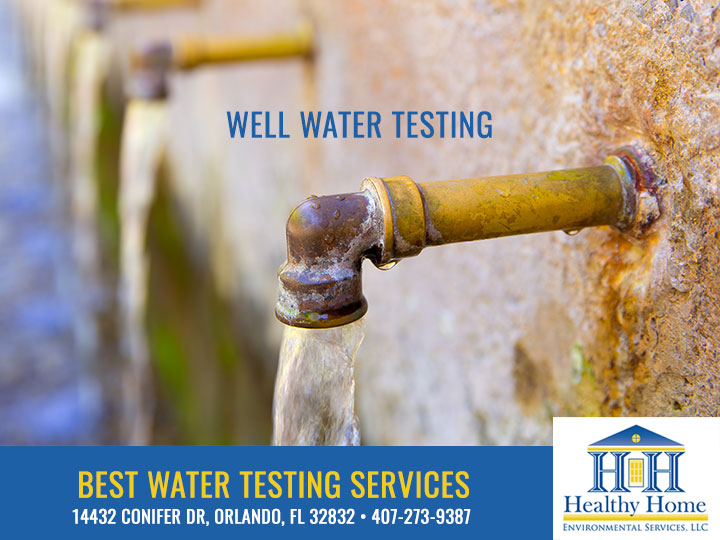Why You Ought To Choose Our Water Testing Service for Your Home
Why You Ought To Choose Our Water Testing Service for Your Home
Blog Article
Learn Just How Water Screening Can Detect Impurities and Shield Your Household's Wellness
Comprehending the relevance of water testing is crucial for guarding your family's health, as our supply of water can harbor hidden threats. From microorganisms to hefty steels, impurities position serious threats, typically undetectable without correct evaluation. By discovering the auto mechanics of water screening, one can reveal the undetectable hazards hiding in apparently excellent water resources. Yet, just how do you determine which examinations are required for your family, and what actions should be taken when prospective dangers are exposed? As we browse these concerns, the path to making sure water security and a much healthier living atmosphere ends up being clearer.
Importance of Water Examining
Identifying the crucial function water plays in maintaining life, the importance of water screening can not be overemphasized. Guaranteeing that water is free from harmful substances is crucial for maintaining healthy areas and environments. Water Tesing Services Orlando.
Water testing acts as an aggressive step to determine possible hazards that might compromise water high quality. With organized analysis, it helps discover physical, chemical, and organic specifications that can pose risks to human health. Regular testing allows for the early discovery of issues, assisting in prompt treatments to avoid extensive contamination and connected wellness troubles.
Furthermore, water screening sustains regulatory compliance, making sure that water suppliers meet established security criteria and guidelines established by governmental authorities. It cultivates openness and accountability, building public rely on the water system system. Screening gives important data that educates water monitoring techniques, making it possible for lasting use and conservation of this priceless resource.
Basically, water testing is an indispensable device that safeguards public wellness, makes sure governing adherence, and promotes the lasting administration of water sources. Its importance in shielding both people and communities can not be ignored.
Usual Water Impurities
Among the numerous elements that can endanger water quality, typical water impurities include a variety of physical, chemical, and organic substances that present considerable dangers to human wellness and the setting. Physical contaminants frequently include debris or organic materials put on hold in water, which can impact clarity and preference. Chemical impurities include a large array of compounds, including pesticides, herbicides, steels like lead and mercury, and commercial chemicals. These chemicals can infiltrate water materials through farming overflow, commercial discharges, or seeping from pipelines and storage tanks.
Organic impurities, largely germs, infections, and protozoa, develop from animal and human waste entering water supply. Pathogens such as E. coli, Giardia, and Cryptosporidium are well-known for triggering intestinal ailments and can be particularly harmful to children, the senior, and those with jeopardized immune systems. Nitrites and nitrates, frequently coming from plant foods, pose another wellness risk, particularly to babies, potentially bring about problems like methemoglobinemia or "blue child disorder."
In addition, arising pollutants, consisting of pharmaceuticals and personal care products, have raised issues due to their persistence and unidentified long-term effects. Comprehending these contaminants is crucial for applying efficient water treatment techniques and making sure risk-free drinking water.
Just How Water Testing Works
Understanding the spectrum of impurities in water underscores the significance of effective testing approaches to safeguard public wellness. Water screening is a systematic procedure made to recognize and quantify numerous pollutants that can posture threats to human wellness.
Chemical screening often entails spectrometry or chromatography, both of which can identify and determine details chemical substances. In addition, physical attributes like shade, ph, and turbidity are examined to offer insight into the general quality of the water.
The precise methods employed in water screening depend on the specific pollutants of problem and the water's meant usage. By continually applying these strenuous screening methods, scientists and public wellness authorities can ensure the security and quality of water, therefore protecting neighborhoods from possible health and wellness hazards.
Selecting the Right Test
The very first action is examining the water resource-- be it municipal, well, or surface water-- as each has unique threats. Local water might require screening for disinfectant results, while well water might need testing for nitrates, microorganisms, and heavy metals.
Following, consider ecological aspects and current events. Nearby farming activities may require screening for herbicides and chemicals, whereas commercial zones can need look for chemical pollutants. Furthermore, any kind of modifications in water taste, smell, or appearance need to motivate certain testing for typical impurities like lead, chlorine, or biological virus.
Specialist water testing solutions supply extensive kits that target a vast array of possible contaminants. These packages often line up with standards established by the Epa (EPA) or local health and wellness divisions. For a more customized approach, speaking with a water quality specialist can give understandings into which certain tests are needed based upon local problems and individual wellness needs, guaranteeing the defense of your family's wellness.

Maintaining Water Safety

In addition to testing, appropriate maintenance of water systems plays an important function. This includes checking and servicing pipes systems, storage space tanks, and septic systems to stop leaks or backflow that could introduce contaminants - Water Testing Services Near Me. Utilizing water filtering systems developed to deal with particular regional issues can navigate to this site even more protect Full Report against contaminations, giving an added layer of defense
Public understanding and education and learning are similarly crucial in preserving water safety. Areas need to be notified concerning possible dangers associated with local water resources and the needed steps to mitigate them. Encouraging public engagement in water safety campaigns fosters a collective obligation that enhances total efficiency.
Ultimately, a thorough technique that integrates routine testing, system upkeep, and community participation is vital in protecting water quality. By doing so, households can be assured of clean and secure water, securing their health and health.

Conclusion
Normal water testing is crucial for determining pollutants such as bacteria, hefty steels, and chemicals that present health dangers. By analyzing water samples, unseen dangers can be detected, guaranteeing the stipulation of secure drinking water. This positive technique aids create a healthier atmosphere and assists in educated decision-making regarding water security. Choosing ideal testing methods and preserving alertness in water quality are important action in protecting public wellness and guaranteeing the health of all household participants.
Understanding the value of water screening is important for guarding your household's wellness, as our water supply can nurture hidden risks.Water screening offers as a positive action to recognize prospective risks that may jeopardize water quality.Additionally, water testing supports regulatory conformity, ensuring that water suppliers meet well-known safety requirements and standards established by governmental authorities. Local water might call for screening for disinfectant byproducts, while well water might require testing for nitrates, germs, and hefty metals.
Regular water screening is an important part in maintaining the high quality of water sources, enabling timely image source treatments prior to impurities get to dangerous levels.
Report this page